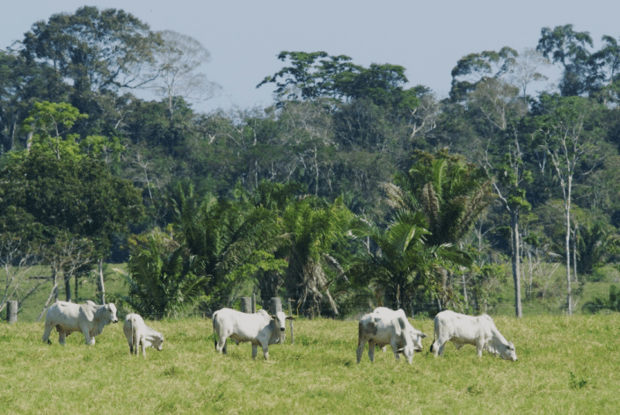We have much more to do and your continued support is needed now more than ever.
How the Brazilian Beef Industry is Helping Protect Wildlife Habitat in the Amazon
The National Wildlife Federation (NWF) and the University of Wisconsin-Madison (UW-M) recently announced the beta launch of a new website and the publication of a new study, highlighting the effectiveness of the market-driven “Zero-Deforestation Cattle Agreements” in the Brazilian Amazon.

The Brazilian Amazon provides a wide range of ecosystem benefits, including habitat for iconic tropical species such as jaguars and macaws, as well as seasonal homes for migratory birds, such as the peregrine falcon and blackpoll warbler that seek sanctuary in the rainforest during the frigid winter months in the U.S.
The large-scale expansion of the cattle herd into the Brazilian Amazon has come at great environmental cost, as enormous tracts of tropical forests have been cut, burned, and converted to pastures. From 1993 to 2013, over 74 million acres of forest was cleared in the Brazilian Amazon biome, an area larger than the state of Arizona. Cattle occupy over two-thirds of all deforested land in this region, and in 2013, there were more than 60 million cattle living in the biome.
Legal compliance has typically been poor in the cattle sector, and efforts aimed at reforming land-use practices have largely been ineffective. However, this trend has changed significantly in recent years. A combination of supply chain interventions, including commitments to zero-deforestation production, and government policies have helped reduce the rates of deforestation in the Brazilian Amazon by over 80% in the past decade. Continued support from responsible companies throughout the supply chain is providing critical support for a range of solutions that are helping sever the links between cattle and forest destruction in the Amazon once and for all.
Zero-Deforestation Cattle Agreements
In 2009, pressure from international retailers and brands, environmental groups, and the federal government, led the largest meatpackers in Brazil to make public commitments to stop directly sourcing cattle from ranches with deforestation and illegal activity. These agreements are helping to reduce deforestation driven by the expansion of cattle ranching in the Brazilian Amazon, and in doing so, are safeguarding critical wildlife habitat and biodiversity.
Conservation Letters Study
The study published in Conservation Letters, “Did Ranchers and Slaughterhouses Respond to Zero-Deforestation Agreements in the Brazilian Amazon?” was led by Dr. Holly Gibbs at the University of Wisconsin-Madison, with a team of colleagues in the U.S. and Brazil including NWF and Imazon, a leading Brazilian NGO. Researchers analyzed these agreements using satellite-based property maps, field surveys with ranchers, and purchase transaction information between ranchers and slaughterhouses. The team found that the “Zero-Deforestation Agreements” prompted ranchers to swiftly register their properties in an environmental registry, led slaughterhouses to actively block purchases from ranches with recent deforestation, and helped reduce deforestation rates among supplying ranches.
The effective implementation of these agreements is in stark contrast to what is often a slow, lethargic, and time-lagged process for law enforcement efforts to bear fruit. The changes in behavior documented by Dr. Gibbs and her team represent a huge win for tropical forest conservation, wildlife habitat, and biodiversity. Support for zero-deforestation production from the major meatpacking companies has had a substantial impact, helping ensure that critical wildlife habitats are safeguarded.
Despite these significant achievements, there are still major loopholes in the agreements, which may diminish the outcomes for forest conservation, and jeopardize the fate of the wildlife habitat and biodiversity in this region. The new website, A Path Towards Zero-Deforestation Cattle, highlights solution-oriented options to help address these issues.
NEW Website
A Path Towards Zero-Deforestation Cattle, offers an interactive way to learn about cattle ranching in the Brazilian Amazon, market links for products such as beef and leather, and the “Zero-Deforestation Agreements”. The site aims to showcase how market-driven initiatives are supporting effective solutions for verified zero-deforestation production. The site also highlights ways that supply chain actors, including ranchers, meatpackers, retailers and brands, as well as government, banks and investors, and even consumers, can support continuous improvement. Recommendations are included on the site for all these actors to help ensure that cattle products sourced from this region do not contribute to the loss of tropical forests and the continued destruction of critical wildlife habitat.
The website is available here (beta-version best viewed in Google Chrome): www.ZeroDeforestationCattle.org
Learn more about NWF’s work on International Wildlife Conservation
![]() Join NWF and help protect forests to safeguard wildlife habitat and biodiversity in the tropics.
Join NWF and help protect forests to safeguard wildlife habitat and biodiversity in the tropics.





















